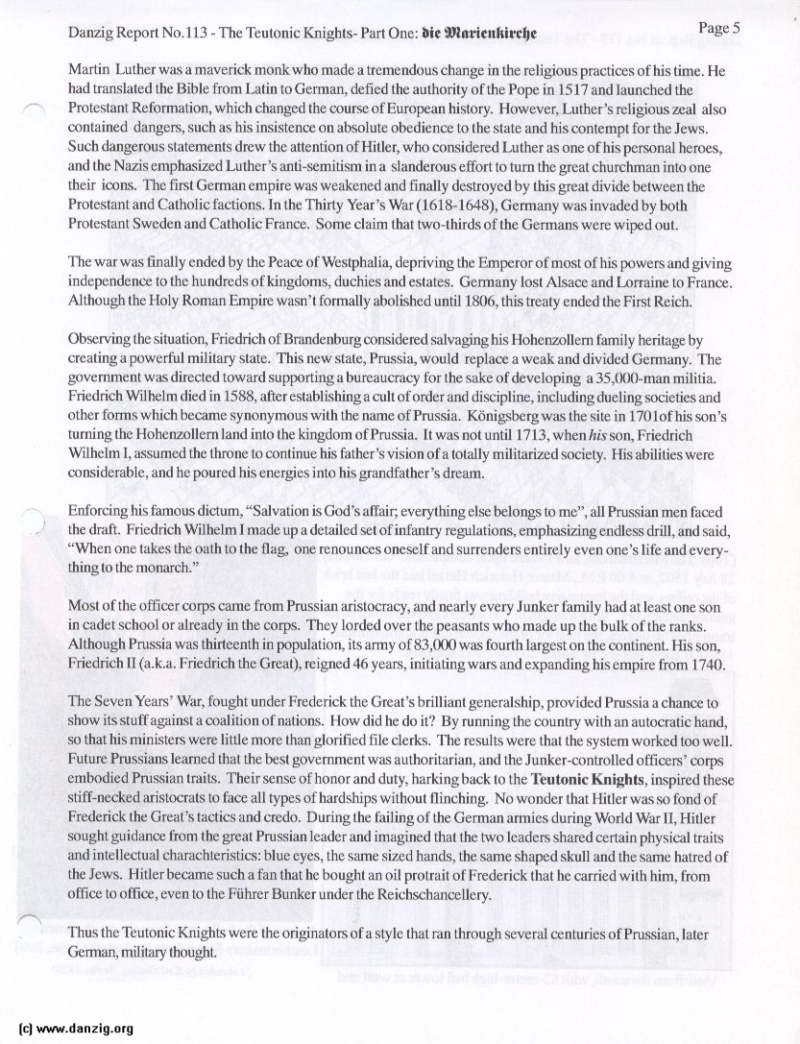
History of the builders of the Marienkirche
Martin Luther was a maverick monk who made a tremendous change in the religious practices of his time. He had translated the Bible from Latin to German, defied the authority of the Pope in 1517 and launched the Protestant Reformation, which changed the course of European history. However, Luther’s religious zeal also contained dangers, such as his insistence on absolute obedience to the state and his contempt for the Jews. Such dangerous statements drew the attention of Hitler, who considered Luther as one of his personal heroes, and the Nazis emphasized Luther’s anti-semitism in a slanderous effort to turn the great churchman into one their icons. The first German empire was weakened and finally destroyed by this great divide between the Protestant and Catholic factions. In the Thirty Year’s War (1618 - 1648), Germany was invaded by both Protestant Sweden and Catholic France. Some claim that two-thirds of the Germans were wiped out.
The war was finally ended by the Peace of Westphalia, depriving the Emperor of most of his powers and giving independence to the hundreds of kingdoms, duchies and estates. Germany lost Alsace and Lorraine to France. Although (he Holy Roman Empire wasn’t formally abolished until 1806, this treaty ended the First Reich.
Observing the situation, Fricdrich of Brandenhurg considered salvaging his Hohenzollern family heritage by creating a powerful military state. This new state, Prussia, would replace a weak and divided Germany. The government was directed toward supporting a bureaucracy for the sake of developing a 35,000 man militia. Friedrich Wilhelm died in 1588, after establishing a cult of order and discipline, including dueling societies and other forms which became synonymous with the name of Prussia. Königsberg was the site in 1701 lof his son’s turning the Hohenzollern land into the kingdom of Prussia. It was not until 1713, when his son, Friedrich Wilhelm 1, assumed the throne to continue his father’s vision of a totally militarized society. His abilities were considerable, and he poured his energies into his grandfather’s dream.
Enforcing his famous dictum, ‘Salvation is God’s affair, everything else belongs to me”, all Prussian men faced the draft. Fnedrich Wilhelm I made up a detailed set of infantry regulations, emphasizing endless drill, and said, ‘When one takes the oath to he flag, One renounces oneself and surrenders entirely even one’s life and everything to the monarch.”
Most of the officer corps came from Prussian aristocracy, and nearly every Junker family had at least one son in cadet school or already in the Corps. They lorded over the peasants who made up the hulk of the ranks. Although Prussia was thirteenth in population, its army of 83,000 was fourth largest on the continent. His son, Friedrich II (a.k.a. Friedrich the Great), reigned 46 years, initiating wars and expanding his empire from 1740.
The Seven Years’ War, fought under Frederick the Great’s brilliant generalship. provided Prussia a chance to show its stuff against a coalition of nations. how did he do it? By running the country with an autocratic hand, so that his ministers were little more than glorified file clerks. The results were that the system worked too well. Future Prussians learned that the best government was authoritarian, and the Junker-controlled officers’ corps embodied Prussian trails. Their sense of honor and duty, harking hack to the Teutonic Knights. Inspired these stiff-necked aristocrats to face all types of hardships without flinching. No wonder that Hitler was so fond of Frederick the Great’s tactics and credo. During the Iiiling of the German armies during World War 11, Hitler sought guidance from the great Prussia leader and imagined that the two leaders shared certain physical traits and intellectual charachieristics: blue eyes, the same sized hands, the same shaped skull and the same hatred of the Jews. Hitler became such a fan that he bought an oil protrait of Frederick that he carried with him, from office to office, even to the Führer Bunker under the Reichschancellery.
Thus the Teutonic Knights were the originators of a style that ran through several centuries of Prussian, later German, military thought.
Danzig Report Nr. 113 - October - November - December - 2001, Page 5.
Hits: 3884
Added: 30/07/2015
Copyright: 2025 Danzig.org

